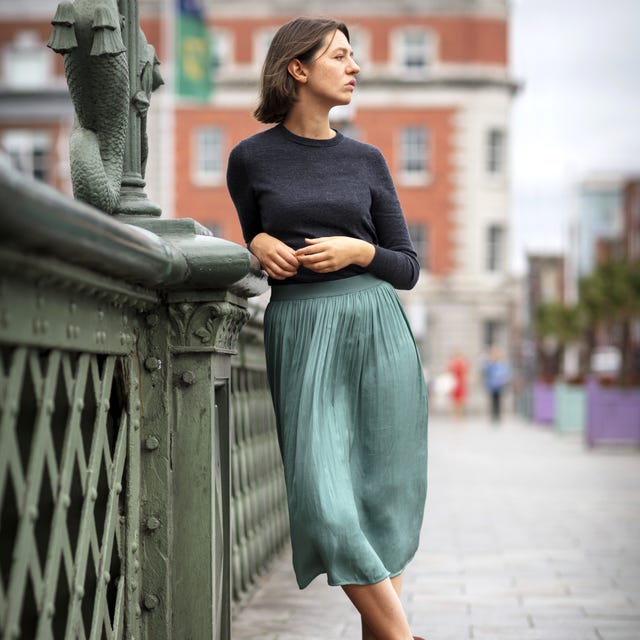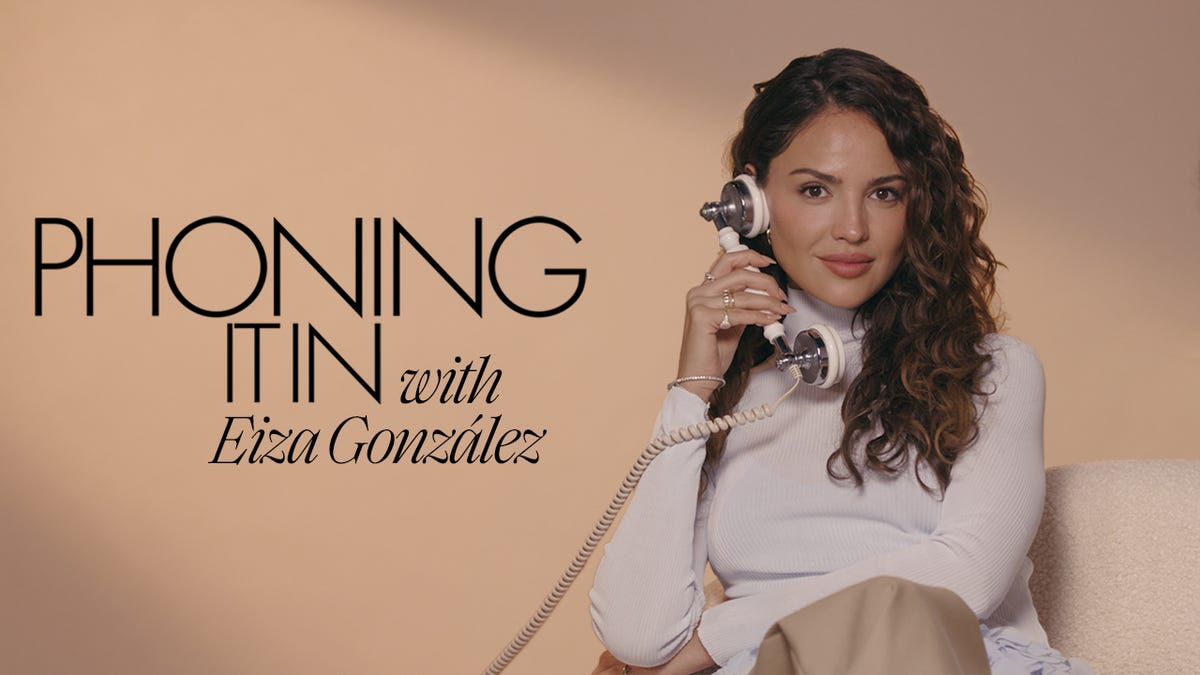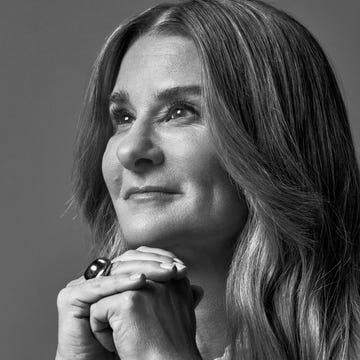About half an hour into our conversation, Sally Rooney and I begin talking about the end of the world as we know it. But maybe it’s best to rewind a bit. When I arrive at the Library Bar, in Rooney’s adopted hometown of Dublin, the 28-year-old author is waiting for me in a low-slung reading chair, politely having chosen a spot next to a window and facing the entryway to avoid any possibility of us missing each other. Hidden on the second floor of the Central Hotel, the bar is unassuming, the kind of place Dubliners know about and tourists miss entirely. It’s cozy.
We say hello and order lunch—a steak sandwich and fries for her, tomato soup for me. It feels appropriate to offer congratulations, since just two days prior, Rooney became the youngest recipient ever of the Costa Novel Award (formerly the Whitbread) for her second book, Normal People. The brilliant coming-of-age novel—out last year in the UK, in April in the U.S.—had already received accolades, such as the Waterstones Book of the Year Award, and had been nominated for the Man Booker Prize. What’s more, Rooney has been dubbed “Salinger for the Snapchat generation” and the “voice of the millennials,” which is a lot of labels. Hype over Normal People has hit such a fever pitch in the literary community that an American friend recently admitted to having been so desperate to read it, she turned to “the black market” to acquire the book.
Rooney nods and says thank you and acknowledges mildly that the praise is nice to hear, but that she is also a bit wary of all the attention. “How am I any more interesting than any other random person on the street?” she asks. “I just don’t get it.”
She might find the attention baffling, but there’s no question that Normal People and her debut novel, Conversations With Friends, struck big, booming chords with readers, and those readers are hungry to know more about the person who wrote them. And so the writer with a propensity for minimalist aesthetics—little to no makeup, an undone brunette lob, lots of turtlenecks—has become something of an It Girl, a term that came into prominence with the 1927 film It, based on a novella by British novelist Elinor Glyn and starring Clara Bow. The film opened with Glyn’s definition of the term, noting that “It” can be “a quality of the mind as well as a physical attraction.” Still, applying the title to Rooney, in 2019, feels uninspired and wrong, or at the very least, diminutive. And anyway, describing someone as the “new thing” in piece after piece doesn’t say much about the work itself.
So let’s try that instead. Rooney has a skill many established writers still don’t, which is the ability to seamlessly weave in our phones, our social media use, our connectivity—and an accompanying awareness of their effects on image and identity and relationships and our brains—into her plots and conversations without making it feel forced or gimmicky. It may be a millennial awareness, but she conveys it with nineteenth-century literary muscle, which makes sense, considering she read loads of Jane Austen and George Eliot while writing both novels. Now she’s on a Henry James tear—and also working on a screenplay of Normal People for BBC Three.
Set partly in Dublin, about five minutes from where we’re sitting, Normal People is about two Trinity College students (Rooney is an alumna) from the same hometown who have a close, complicated, and secretive high school history. It is also about attraction and depression and sex and ennui and youth and social/class structure and feelings and love and the difficulty of sharing and expressing emotions in an age when there are too many means of getting in contact with one another. So all these devices are used, either with caution, or recklessly, or with a serving of side-eye. Conversations With Friends is also about these things, and yet they are very different books about very different people.
Author Sheila Heti, Rooney’s friend, says of the young writer’s work, “There is something delicious about her writing. Even the first scene in Normal People, with the woman in her stockings—that detail is so good. It brings you in.” Heti also appreciates Rooney’s somewhat pared-down style: “The way she writes feels radically confident, and yet there is a quality of abasement to what her characters go through, so the confidence is tempered by that.” Heti agrees with the common view that “there’s something of the nineteenth-century novelist about her,” but stresses that Rooney’s work feels ultra contemporary.
Rooney admits to being a fan of the era, “but in a very conflicted way, because it’s so structurally bourgeois, and there’s so much that it can’t accommodate, even about gender. And so often the female protagonist who subverts the confines of the nineteenth-century bourgeois novel just dies at the end because she’s too dangerous. It’s like the author can’t handle her, so she just dies. She’ll just drop dead. Someone will kill her, or she’ll die of a mysterious illness,” she says. “Henry James does that, Dostoevsky does that; so even though I feel this deep connection to the nineteenth-century novel, and spend a lot of time reading them and reading about them, I also feel this kind of repulsion or anger or frustration about the limits of this form—and also how there still are limits.”
The form she loves is defined by the strictures of capitalism, something Rooney also finds problematic. “The system is broken,” she says. And if it seems like it’s working in one place, “that’s because they’ve exported all the bad parts somewhere else.” I concur, citing the very American habit of driving cars through suburban sprawl to buy cheap consumer goods made in sweatshops. “I love walking,” Rooney says. “Half my boyfriend’s family is American, and I remember the first time he sent me a photograph of a suburban street that didn’t have a sidewalk.” Rooney might wish people would read more about our current state of environmental devastation and less about her life, but she doesn’t want to be in the position of prescribing that, either.
All that said, there are bright spots, like when Irish women worked together to overturn the country’s ban on abortion last spring, Rooney points out. She believes in socialism’s ability to effect positive change, but she worries there might not be enough time left. “It’s the speed at which the planet is dying that makes me think a full-on civilizational collapse is a strong possibility,” she says. “I mean, maybe if civilization collapses and we just completely halt the whole thing, the fossil fuels, etcetera, maybe the earth will, in time, return to being livable again, but without all the infrastructure of human civilization as we know it. Where human beings continue, just without all the accoutrements, like electricity and so forth.”
But until then, what does a writer do? If you’re Rooney, you keep writing. And besides, not all end times are negative. The Irish ban on abortion is gone. I’ve called her an It Girl and immediately retired its usage. And for the first time in recent memory, the latest young literary superstar being billed a genius is not male. Seated across from her, I am actually slightly scared of her intelligence—it’s easy to see how she became a champion debater in college, and the millennial generation would no doubt be happy to accept her as its spokesperson were she so inclined. If we’re lucky, she will write until the end. And we will read, if only to help us understand what is happening.
This article originally appeared in the April 2019 issue of ELLE.














